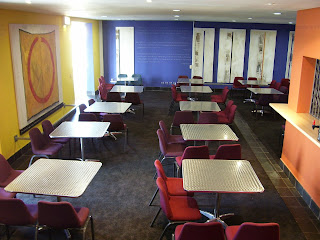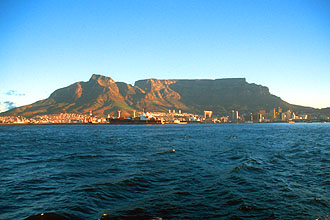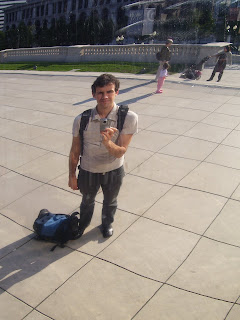You have to go into Cape Town to get a decent cup of coffee around here. A place I often go, Vida é Café, is fairly hip and there is always a big crowd of people sipping their cappuccinos and smoking their cigarettes outside. I suspect it is a Richard Branson enterprise because there is Virgin (airlines, mobile phones, music, etc.) advertising on promotional materials. It is on Kloof Street, an area where residents have money, and which is predominately white.
Sitting there the other day, drinking my latte, I was thinking about how obvious the legacy of apartheid is in a place like that. The boundaries between white and black were forcibly drawn by the government through the Group Areas act and other measures. Although there is more diversity in the affluent neighborhoods since 1994, the old borders are still strongly fortified by entrenched habit and a legacy of economic disparity. All of the guys making the coffee and busing the cups are black, while almost without exception the customers are white. On visits to the nearby wine regions you see the same division: groundskeepers and agricultural laborers are black, wine tasters are white (although shop staff at some wineries are refreshingly mixed).
Drinking wine, like sitting and drinking my latte, is a very white thing to do, at least in South Africa. It is something with an exclusive air about it; some degree of snobbery is involved. Indeed, this is a part of what people like about it. Having a refined taste in wine (or coffee) is something people are proud of and seek to cultivate. But there is also a sense in which this cultivation, this refinement, is meant to set one apart from "the masses", from the "common people". In this country, even more glaringly than in the US, sophistication and commonness have a skin color. The trouble is, I like wine, I like coffee, and I like having the taste to be able to distinguish between the good stuff and rubbish. On some level, I am proud of it, and even feel a bit smug around those with a "less refined" taste. What is troubling is the realization that taste is a commodity that can be purchased, and one of the benefits taste affords is to remind those with the means to have good taste of their privilege.
This is what is perhaps most disturbing to me about these reflections: although I want to side with those who are dismissed as "common" (or some equivalent epithet) by those who are privileged, I am extremely comfortable being around privileged people and surrounded by their accoutrements. When I come into town, go to a café, and look around at the shops of this affluent neighborhood as I savor the longed-for cup of coffee, I breathe an internal sigh of relief. I realize that I miss the "First World" lifestyle I am accustomed to, I miss "civilization". I don't think of myself as being upper class (and in the States I'm not) but on a global scale I am rich.
When I travel the fifteen or so miles from Guguletu to Cape Town, there is a sense in which I am coming home, and my mindset quickly changes to accommodate this other environment. I am protective of what I have, fearful that others will take it from me. I look distrustfully at other people, especially people of color, whom I pass on the street, and I experience an underlying paranoia about my safety. I am afraid, and everyone becomes suspicious, a target of my fear. In Guguletu I am unlikely to see another white person all day, aside from my coworker Tony. Everyone I work with, everyone I pass on the street is black. And I am not afraid. I talk to people, they are friendly, I never feel that I am unwelcome or the target of hostility. So why is it that when I go to a place where there are lots of other white people around I become so distrustful of non-whites? It is like a contagious disease of the spirit that takes me over, that possesses me, as soon as I go into the white part of town.
I may work in Guguletu and live in Athlone, but at the end of the day am I any different from the white people with their white friends in designer clothes sitting around me at the coffee shop? Am I a better person than they because I initiate conversation with the guys behind the counter? Or am I just like George on "Seinfeld" trying to prove that I have black friends? Am I any more open to people outside of my cultural, ethnic, and socio-economic group? Do I belong in a context outside this one any more than they do? These people probably aren't racists, or at least they don't think of themselves as such. Maybe they are idealistic, compassionate, justice-loving liberals like I like to think I am. But at the end of the day is their idealism -- is
my idealism -- anything more than just another consumer choice, like the Nelson Mandela and Ché Guevara t-shirts I see young white men wearing as they walk past? Wasn't my initial reaction: "Hey that's a cool shirt! I w0nder where I can get one?" The deep irony about Ché, of course, is that the image of this communist freedom fighter is now a popular capitalist consumer item. And while wearing a t-shirt is a consumer choice, a fashion choice, like every black South African Mandela's fight against apartheid was a life or death issue.
This is the big difference that I am aware of as I sit at the café: my activism is optional. I can go to Guguletu, I can "be in solidarity with the poor", but whenever I want to I can leave. I have the power to choose, and I could not fully renounce that power if I wanted to. Even someone like Mother Theresa has the possibility of leaving Calcutta if she really wants to. Her order can reassign her somewhere else. And I really don't want to renounce my power to choose. Does that make my solidarity less heartfelt? Does it make me a bad person? Should I feel guilty about my privilege? I am not sure that this is the right question, but it is worth exploring. I have had discussions before with friends in the States about whether or not we should feel guilty about being "the haves" in the midst of so many "have-nots". Usually the argument contra-guilt is that we aren't responsible for someone else's poverty or misfortune. Even if it is not the alleged fault of the poor person that she is poor, it is certainly not
my fault.
I haven't oppressed anyone. Besides, feeling guilty doesn't really help anyone, now does it?
It is true that feeling guilty can disempower a person. We feel guilty, but don't know how to change the situation. Or we respond not to help another person in the long term but just to assuage our guilt. Do I give change to the beggar on the street because it is an effective way to help the person, or because I will feel guilty if I say No? It's not charity,
caritas, it's pity. Guilt can defeat us, make us feel worthless and unable to respond helpfully or compassionately. Guilt of this kind actually serves the opposite purpose of what it should. Because, despite the difficulties above, guilt actually is an appropriate response to certain situations. If I am the beneficiary of an injustice, even if I didn't cause it, should I be exempt from feeling any guilt? When I see the disparity between the way I live and the way many people in Guguletu live, and I know it is not because I
deserve to live in such better conditions (there is no Aristotelian justice in the difference), I should be unsettled, even guilty.
To make this seem like less of a jump, let's pretend I am white South African. I am a liberal who opposed apartheid but has always had enough money to live very comfortably in a decent neighborhood. The system has enabled and empowered me to live in this way, to be educated, to start my own business, or what have you. At the same time, the system has disempowered and disabled black South Africans from having the same opportunities, and restricted them to squalid townships. They are allowed into my white neighborhood only with the appropriate pass, and only to work in a defined range of professions, like domestic servant or bus driver. I did not design the apartheid system and do not support it. I have not voted for the National Party, and maybe I have even given money to charitable causes that help people in the townships. Although I may not be at fault, am I any less responsible? If I have benefited from injustice, some sense of guilt is not inappropriate. For a more artful use of this example, read J.M. Coetzee's
Age of Iron, which I just finished reading last night.
There is good reason to be wary of people trying to make us feel guilty. Christianity in all its denominational forms has often been resented and rejected for using guilt in a manipulative way, as a means of excluding "sinners" and masking the hypocrisy of the righteous. And rightly so. Christians have been the cause of a lot of evil, a lot of judgment, and lot of hurt in this world. And guilt has been one of the keenest weapons by which these hurts have been caused. But it is a mistake to throw out the concept of guilt on the basis its misuse. I say misuse because guilt does play an important role in human life when we have not been conditioned to feel it inappropriately, for inappropriate things. Guilt is a very good thing when we feel it in response to appropriate actions or situations. Sometimes we feel guilty for things we have knowingly done wrong. Other times we feel guilt when we discover the hurt we have caused inadvertently, and unknowingly. If, for instance, as a white person I have benefited from some degree of opportunity, or at least had certain challenges and blockades withheld from my path, merely because of my skin color I should feel bad about this. I should, in some fashion, feel guilty. The question is, how should I respond to that guilt?
Sometimes, guilt makes us feel powerless. The guilty person feels worthless, cut off, unworthy of being loved by other human beings. We are bad people, we deserve our condemnation, and we are liable to do whatever the authority or the offended party tells us to. We will do anything to be loved again. Guilt, in this sense, leads us to despair. It degrades us and robs us of our dignity and self-respect. I am guessing that everyone reading this knows something of how this works. Guilt can also just harden us. It can make us resentful of the challenge to our dignity, and resign us to keep doing the behavior out of spite towards our accusers. We deny that we have done wrong, we refuse to take responsibility. Guilt can drive us into ourselves, disregarding the impact of our life on others' lives, closing us off from other human beings. Both of these responses isolate us from others, and undermine our relationship of mutual responsibility with other people.
But there is at least one more response to guilt, which I think is the intention at the heart of its traditional Christian usage, namely to move us toward repentance. Not just saying "sorry" but turning around in a different direction, changing my behavior to undo, or at least stop doing, the harm I have caused. Repentance tries to repair the damage, even if only partially. Guilt that moves us to repentance moves us to restore the bonds of relationship with other people that our actions, intentional or inadvertent, have broken. Repentance offers grace and forgiveness, but it still asks something of us. It isn't cheap. It involves us making ourselves vulnerable, just as the person who has suffered is vulnerable. It doesn't mean vengeance, "an eye for an eye". It doesn't necessarily mean that I move out of my house and go live in a shack, but it also doesn't mean that I go on living as before once my eyes are opened to how I have benefited, even indirectly, from another's misfortune and oppression. If I repent, I need to
act to restore things, not just for the person who has been wronged but for myself. Rather than being defeated by guilt, allowing it to tell me that I am a bad person, unworthy of love and dignity, repentance allows me to use guilt to reaffirm and reestablish my humanity. Repentance is a positive action that is empowered by guilt appropriately felt and appropriately used.
Part of the problem with the word guilt, is that we associate it with punishment instead of responsibility. If the word guilt in my above examination makes you uncomfortable, try it again using responsibility instead. I have a responsibility to correct wrongs done in my name, even if I didn't ask anyone to do them. Guilt is only a bad thing, the object of our deserving disapprobation, when it is used to paralyze us rather than empower us. Part of the grace of grace is that guilt, condemnation, is not given the last word. Grace puts guilt in its proper place and allows it to be useful, rather than destructive. Grace is the key in the discussion of racism that got me started above. Read Nelson Mandela's autobiography
Long Walk to Freedom or anything by Desmond Tutu, and you can see the extraordinary grace that so many black South Africans have had in the process of reconciliation since apartheid ended. It hasn't all been roses, and huge problems remain, but it is this spirit of grace that allowed democracy to happen here in the first place. I will post more about these men when I have read more of their work. I leave these reflections incomplete, inconclusive, because they remain that way in my mind and heart. I am in the process of figuring out what to think and how to respond. Thanks for having the grace to go part way with me.

 presents an incomplete picture.
presents an incomplete picture.




























